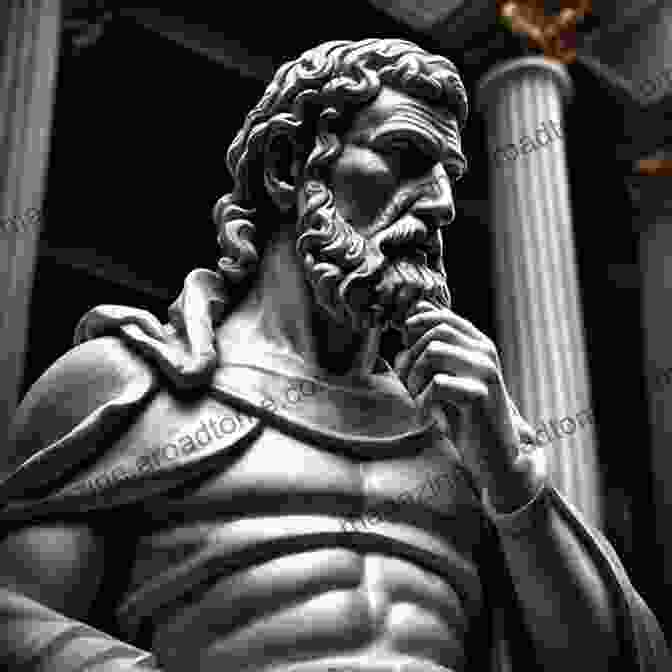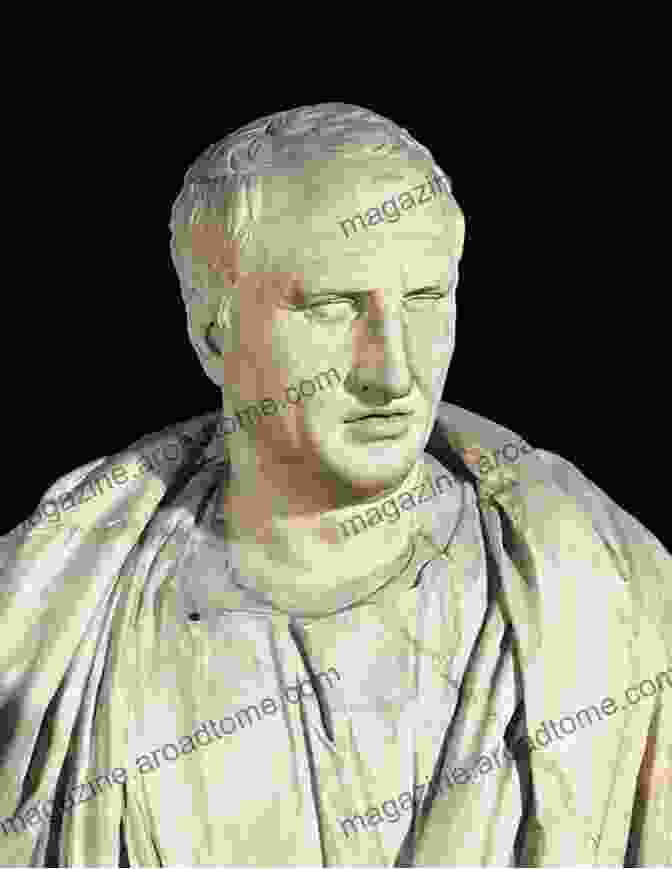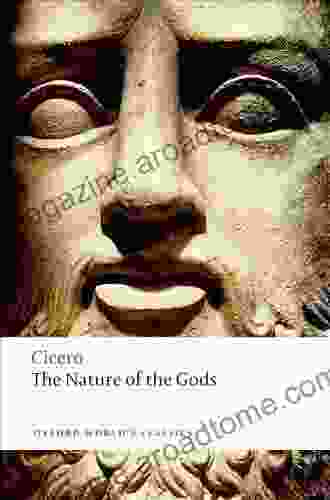Unravel the Divine Mysteries with "The Nature of the Gods: Classics"


Exploring the Essence of Divinity
Embark on an enlightening journey into the enigmatic realm of the divine with Marcus Tullius Cicero's seminal work, "The Nature of the Gods: Classics." This timeless masterpiece delves into the profound questions that have captivated humanity for millennia: What is the nature of the gods? Do they exist, and if so, what is their true nature?
4.3 out of 5
| Language | : | English |
| File size | : | 2470 KB |
| Text-to-Speech | : | Enabled |
| Screen Reader | : | Supported |
| Enhanced typesetting | : | Enabled |
| Word Wise | : | Enabled |
| Print length | : | 271 pages |
Cicero, a renowned Roman philosopher and orator, deftly presents the arguments and perspectives of the leading philosophers of his time, including the Epicureans, Stoics, and Academics. Through their incisive debates, he examines the existence, attributes, and role of the gods in human affairs.
Epicurean Views: Detaching from Divine Intervention
The Epicureans approached the nature of the gods with a pragmatic and naturalistic perspective. They argued that the gods exist as blissful and immortal beings who reside in the intermundia, a realm beyond our mortal reach. However, they believed that these deities play no active role in human affairs or the workings of the universe.

According to the Epicureans, the universe operates on its own accord, governed by natural laws and mechanisms. Human actions and experiences are determined by chance and the interactions of physical bodies. Detaching from the belief in an intervening deity, they advocated for a life free from superstition and religious fear.
Stoic Perspectives: Embracing Divine Providence
In contrast to the Epicureans, the Stoics held a more theistic view of the gods. They believed in a divine force or reason that permeates the universe and guides all events. This force, often identified as Zeus or Jupiter, is both benevolent and just, overseeing the cosmos with a harmonious purpose.

Stoic philosophy emphasized the importance of aligning oneself with this divine providence. By living in harmony with nature and reason, individuals could achieve inner peace and fulfillment, regardless of external circumstances. The Stoics believed that the gods observe and care for humankind, providing guidance and support through the tapestry of life.
Academic Scepticism: Questioning Divine Certainties
The Academics adopted a more skeptical approach to the nature of the gods. They argued that it is impossible to attain absolute knowledge about the divine realm. While they did not deny the possibility of gods, they maintained that human understanding is limited and prone to error.

The Academics advocated for a cautious and open-minded approach to religious beliefs. They emphasized the importance of suspending judgment and acknowledging the limits of human knowledge. True wisdom, they believed, lay in recognizing the uncertainty of divine matters and living in accordance with reason and ethical principles.
Cicero's Synthesis: A Balanced Perspective
Throughout "The Nature of the Gods: Classics," Cicero skillfully weaves together the contrasting viewpoints of Epicureans, Stoics, and Academics. He refuses to align himself firmly with any one school of thought, instead presenting a balanced and nuanced perspective.

Cicero's own stance on the nature of the gods remains ambiguous throughout the work. He recognizes the validity of both theistic and atheistic arguments, ultimately leaving it up to the reader to draw their own s. However, he emphasizes the importance of intellectual inquiry and the pursuit of knowledge in understanding the divine.
Legacy and Influence
"The Nature of the Gods: Classics" has had a profound and enduring impact on Western thought and philosophy. Its exploration of the nature of divinity has inspired and challenged generations of thinkers, shaping religious and philosophical beliefs throughout history.
The work has been translated into numerous languages and continues to be studied and debated by theologians, philosophers, and scholars alike. It remains an invaluable resource for anyone seeking to deepen their understanding of the divine and its role in human existence.
In "The Nature of the Gods: Classics," Marcus Tullius Cicero invites us on an illuminating quest to unravel the enigma of the divine. Through a masterful dialogue, he presents the arguments and perspectives of some of antiquity's greatest minds, leaving us to ponder the timeless questions that have captivated humanity for centuries.
Whether you seek to explore the nature of divine existence, deepen your understanding of ancient philosophies, or simply engage in thoughtful reflection, "The Nature of the Gods: Classics" offers a profound and captivating journey that will ignite your intellect and challenge your beliefs.
4.3 out of 5
| Language | : | English |
| File size | : | 2470 KB |
| Text-to-Speech | : | Enabled |
| Screen Reader | : | Supported |
| Enhanced typesetting | : | Enabled |
| Word Wise | : | Enabled |
| Print length | : | 271 pages |
Do you want to contribute by writing guest posts on this blog?
Please contact us and send us a resume of previous articles that you have written.
 Book
Book Novel
Novel Page
Page Chapter
Chapter Text
Text Story
Story Genre
Genre Reader
Reader Library
Library Paperback
Paperback E-book
E-book Magazine
Magazine Newspaper
Newspaper Paragraph
Paragraph Sentence
Sentence Bookmark
Bookmark Shelf
Shelf Glossary
Glossary Bibliography
Bibliography Foreword
Foreword Preface
Preface Synopsis
Synopsis Annotation
Annotation Footnote
Footnote Manuscript
Manuscript Scroll
Scroll Codex
Codex Tome
Tome Bestseller
Bestseller Classics
Classics Library card
Library card Narrative
Narrative Biography
Biography Autobiography
Autobiography Memoir
Memoir Reference
Reference Encyclopedia
Encyclopedia K L Taylor
K L Taylor Kenneth R Rosen
Kenneth R Rosen Kevin Whipps
Kevin Whipps Suzanne Wagner
Suzanne Wagner Robert G Lahita
Robert G Lahita Kellyann Petrucci
Kellyann Petrucci Kathleen Wiegner
Kathleen Wiegner Karla Mclaren
Karla Mclaren Keri Davies
Keri Davies Stratford Caldecott
Stratford Caldecott Kelly Cunnane
Kelly Cunnane Karen Carnabucci
Karen Carnabucci Karrie Lynn Pennington
Karrie Lynn Pennington Ken Shelf
Ken Shelf S Yizhar
S Yizhar Kevin T Patton
Kevin T Patton Peter Piven
Peter Piven Kathryn Mulcahy
Kathryn Mulcahy Vic Ferrari
Vic Ferrari Karl Wiegers
Karl Wiegers
Light bulbAdvertise smarter! Our strategic ad space ensures maximum exposure. Reserve your spot today!

 Ibrahim BlairUnveiling the Hidden Truths: A Journey into 'What Your Doctor Still Doesn't...
Ibrahim BlairUnveiling the Hidden Truths: A Journey into 'What Your Doctor Still Doesn't... Arthur Conan DoyleFollow ·3.6k
Arthur Conan DoyleFollow ·3.6k Brennan BlairFollow ·19.3k
Brennan BlairFollow ·19.3k Ray BlairFollow ·19.5k
Ray BlairFollow ·19.5k Kenzaburō ŌeFollow ·19.6k
Kenzaburō ŌeFollow ·19.6k Alan TurnerFollow ·18.7k
Alan TurnerFollow ·18.7k Jonathan HayesFollow ·7.1k
Jonathan HayesFollow ·7.1k Edmund HayesFollow ·18.3k
Edmund HayesFollow ·18.3k Pete BlairFollow ·3.2k
Pete BlairFollow ·3.2k

 Francis Turner
Francis TurnerLearn to Make the Perfect Tapas Dishes Through the...
If you're looking to...

 Victor Turner
Victor TurnerUnlock the Secrets of Publishing Law: A Comprehensive...
Embark on a literary journey where the...

 Casey Bell
Casey BellHealing Crystals: Essential Crystals for Beginners
Unveiling the Mystical...

 Nick Turner
Nick TurnerOne Hundred Years of Fire Insurance: A History of...
Chapter 1: The...
4.3 out of 5
| Language | : | English |
| File size | : | 2470 KB |
| Text-to-Speech | : | Enabled |
| Screen Reader | : | Supported |
| Enhanced typesetting | : | Enabled |
| Word Wise | : | Enabled |
| Print length | : | 271 pages |













